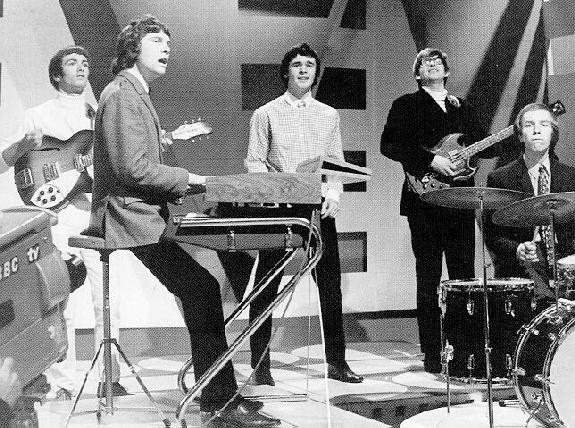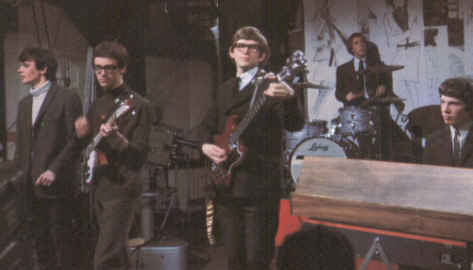 |
Colin Blunstone:
vocals
b. Colin Edward Michael Blunstone, 24 June 1945, Hatfield, England |
Paul Atkinson:
guitar
b. Paul Ashley Warren Atkinson, 19 March 1946, Cuffley, England;
d. Los Angeles, 2 April 2004 |
Rod Argent:
keyboards, vocals
b. Rodney Terence Argent, 14 June 1945, St. Albans, England |
Hugh Grundy:
drums
b. Hugh Birch Grundy, 6 March 1945, Winchester, England |
Chris White:
bass
b. Christopher Taylor White, 7 March 1943; Barnet, England |
| |
| Billed as one of the
smartest bands of the British Invasion, the Zombies created music
that was at once emotional and sophisticated. |
|
| Colin Blunstone's
breathy high tenor brings a sense of fragility and erotic passion to a
musical sound that suggests a kind of delicacy and exoticism. Rod Argent's
jerky, light-textured compositions owe inspiration to jazz and rock as
well as the classical realm. He was one of the most talented and well-informed
composers working in realm of mid-sixties British pop. Moreover, his distinctive
style of piano playing (on an early Hohner electric piano) perfectly complemented
Blunstone's vocals creating a sonic and cultural equivalent of a Balinese
gamelan: controlled and delicate while at the same time emotionally charged. |
| |
| 1961
[RA age 15-16; CW age 13-14] |
| Rod Argent, Colin Blunstone,
Hugh Grundy, and Paul Atkinson with Paul Arnold (bass) formed the original
version of the band in St Albans where several of them are students at
the St. Albans Grammar School, (Hertfortshire). Arnold eventually left
to continue his schooling (and became a physician) and the band replaced
him with Chris White (bass). Among the venues in which they rehearsed
was a flat above White's father's store. The band began by calling themselves
names such as the Mustangs and the Sundowners. Arnold came up with the
idea of "The Zombies" (Palao 1997:09). |
| |
| 1962
[RA age 16-17; CW age 14-15] |
| |
| 1964
[RA age 18-19; CW age 16-17] |
| 5 April. Watford Town
Hall, "Herts Beat Contest: first heat." The Zombies participate in a competition
sponsored by the London Evening News to find the "top beat group
in the country" (Palao 1997:14). The Zombies survive the heat. |
| 10 May. Watford Town
Hall, "Herts Beat Contest: final heat." The Zombies win the contest and
£250. White: "Rod had take a year off before university. Colin went into
insurance. Hugh was in a bank, and Paul had applied to go to university
starting September 1964. His parents definitely didn't want him to be
in a beat group. I'd just applied to do my final year's training in Bournemouth,
but I cancelled it. So we won the Herts Beat final, which was a final
fling, and then we got all these offers, so we thought 'why don't we try
it for a year'" (Palao 1997:15). The band signs a production/publishing
contract with Ken Jones (and Joe Roncoroni) of Marquis Enterprises who
follow up on an inquiry from Dick Rowe of Decca Records. Because they
are underage (below 21 years), their parents sign the contracts for them
(Palao 1997:116-17). |
| 12 June. Decca's recording
studios (#2) in West Hampstead: "It's Alright with Me," "She's Not There,"
"You Make Me Feel Good," and "Summertime." |
| 24 July:"She's
Not There" / "You Make Me Feel Good" |
| Late July. The Zombies
seek out a manager they think will get them television and radio time
as well as get them regular performances at good pay. They sign with Tito
Burns. Argent: "That's the one time we took all the advice the world.
We thought, 'We've got to get a good manager,' so we consulted with lawyers
and solicitors, and we ended up with someone with a very dubious way of
looking at things. The very first tour we did, Tito said, 'Now boys, you've
got a hit coming upt the charts, what do you want to do? I can book you
out for the next three months' — it really was three months. I think there
vitually was not a day off. 'I can either get you guarantees, you'll be
guaranteed a sum each night, or you can take a percentage, which would
be riskier.' So completely naive, we said 'Well, what do you recommend?'
And he said, 'I recommend you take the guarantees.' We later found out
that he'd sold us to an agency that was run by his wife, because it was
strictly illegal for the manager to be the agent [too], so his wife was.
And of course she was putting us out for £250 a night and we were getting
£100. In 1964, that was quite a lot of money" (Palao 1997:18). |
| 31 July. Appearance
on Ready Steady Go. |
| Blunstone: "We carried our
own PA: it was two T60 bass cabinets with the speakers, with an AC-100
Vox PA amp. Certainly, it gave us an edge in the early days because it
meant we had a very good vocal sound. Our road manager hurt his back,
he couldn't lift anything, so often at gigs we had to lift all the gear
out. And early on, girls would be trying to cut our hair. I'd see these
scissors going past my eyes while I've got an amp in my arms, and I'd
think 'Oh dear, someone's going to get maimed here!" (Palao 1997:19).
|
| October: "Leave Her
Be" / "Woman" |
| 23 December:
The Zombies embarked on a restricted US tour. In the face of a cultural
invasion, the American Federation of Musicians sought to limit strictly
the number of British musicians arriving in the United States. The INS
did eventually allow them to play dates in New York City and the Zombies
participated in a grueling stint of matinees and evening performances;
eight shows a day. |
|
| June.
"I Want You Back Again" / "Once upon a Time" |
| 15 July
to 19 August. Another American tour. |
| September:
"Whenever You're Ready" / "I Love Her" |
| November:
"Is this a Dream" / "Don't Go Away" |
| |
| 1966
[RA age 20-21; CW age 18-19] |
| 10 February. Otto Preminger's
film, Bunny Lake Is Missing premiers featuring a clip of the Zombies
performing as if on a television show. |
| |
|
| The
Zombies continued to record through the sixties, but had no further hits
until 1969's "Time of the Season," released in the United States after
they had disbanded (1968). Their management company seems to have made
most of the money from their performances. |
